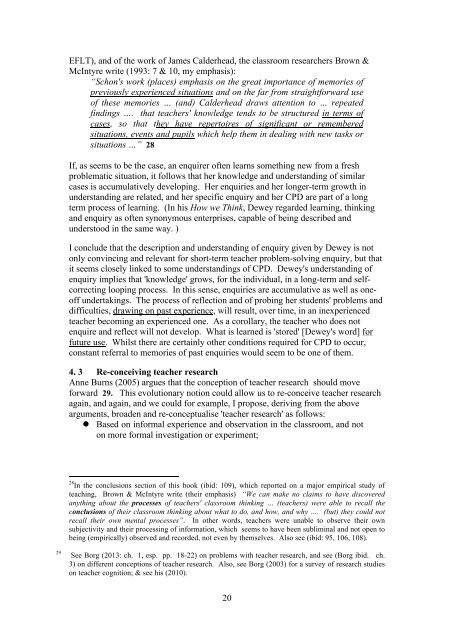RADICAL TEFL
2hqhXJd
2hqhXJd
Create successful ePaper yourself
Turn your PDF publications into a flip-book with our unique Google optimized e-Paper software.
EFLT), and of the work of James Calderhead, the classroom researchers Brown &<br />
McIntyre write (1993: 7 & 10, my emphasis):<br />
“Schon's work (places) emphasis on the great importance of memories of<br />
previously experienced situations and on the far from straightforward use<br />
of these memories … (and) Calderhead draws attention to … repeated<br />
findings …. that teachers' knowledge tends to be structured in terms of<br />
cases, so that they have repertoires of significant or remembered<br />
situations, events and pupils which help them in dealing with new tasks or<br />
situations …” 28<br />
If, as seems to be the case, an enquirer often learns something new from a fresh<br />
problematic situation, it follows that her knowledge and understanding of similar<br />
cases is accumulatively developing. Her enquiries and her longer-term growth in<br />
understanding are related, and her specific enquiry and her CPD are part of a long<br />
term process of learning. (In his How we Think, Dewey regarded learning, thinking<br />
and enquiry as often synonymous enterprises, capable of being described and<br />
understood in the same way. )<br />
I conclude that the description and understanding of enquiry given by Dewey is not<br />
only convincing and relevant for short-term teacher problem-solving enquiry, but that<br />
it seems closely linked to some understandings of CPD. Dewey's understanding of<br />
enquiry implies that 'knowledge' grows, for the individual, in a long-term and selfcorrecting<br />
looping process. In this sense, enquiries are accumulative as well as oneoff<br />
undertakings. The process of reflection and of probing her students' problems and<br />
difficulties, drawing on past experience, will result, over time, in an inexperienced<br />
teacher becoming an experienced one. As a corollary, the teacher who does not<br />
enquire and reflect will not develop. What is learned is 'stored' [Dewey's word] for<br />
future use. Whilst there are certainly other conditions required for CPD to occur,<br />
constant referral to memories of past enquiries would seem to be one of them.<br />
4. 3 Re-conceiving teacher research<br />
Anne Burns (2005) argues that the conception of teacher research should move<br />
forward 29. This evolutionary notion could allow us to re-conceive teacher research<br />
again, and again, and we could for example, I propose, deriving from the above<br />
arguments, broaden and re-conceptualise 'teacher research' as follows:<br />
l Based on informal experience and observation in the classroom, and not<br />
on more formal investigation or experiment;<br />
28 In the conclusions section of this book (ibid: 109), which reported on a major empirical study of<br />
teaching, Brown & McIntyre write (their emphasis) “We can make no claims to have discovered<br />
anything about the processes of teachers' classroom thinking … (teachers) were able to recall the<br />
conclusions of their classroom thinking about what to do, and how, and why …. (but) they could not<br />
recall their own mental processes”. In other words, teachers were unable to observe their own<br />
subjectivity and their processing of information, which seems to have been subliminal and not open to<br />
being (empirically) observed and recorded, not even by themselves. Also see (ibid: 95, 106, 108).<br />
29<br />
See Borg (2013: ch. 1, esp. pp. 18-22) on problems with teacher research, and see (Borg ibid. ch.<br />
3) on different conceptions of teacher research. Also, see Borg (2003) for a survey of research studies<br />
on teacher cognition; & see his (2010).<br />
20


